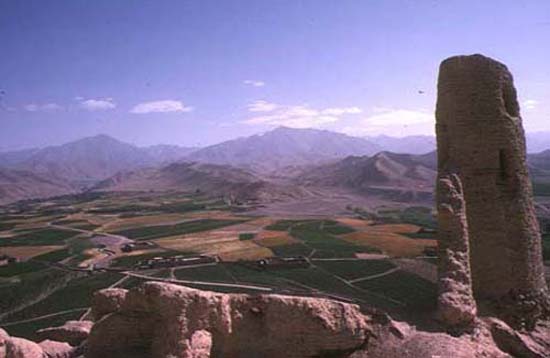
U.S. military officers in Afghanistan say it will be impossible to defeat the Taliban there as long as Waziristan offers them what is their biggest sanctuary in the Afghan-Pakistani theater. Waziristan's Taliban include fighters from the former Afghan Taliban regime, some Arabs, Chechens and other foreigners -- and thousands of new Pakistani recruits, local residents and journalists say. Hassu Khel's ordeal suggests a key reason why repeated Pakistani army offensives in Waziristan have failed to defeat the Taliban. The army-led government is relying too heavily on military force and has no effective political strategy to win over Waziristan's estimated 1 million people, say residents and analysts such as Behroz Khan, a Pakistani journalist who monitors the region. Journalist James Rupert, head of Newsday's international bureau in Islamabad, Pakistan began his career abroad as a Peace Corps volunteer, teaching mechanics and welding in Morocco.
James Rupert writes: Taliban grabs hold in Pakistan
Taliban grabs hold in Pakistan
BY JAMES RUPERT
Pakistan, July 13, 2006: The guerrilla commander's voice boomed into the dark at Hassu Khel, a farming village in this country's borderland with
Afghanistan.
Through a loudspeaker, the voice warned Pakistani troops camped at the village's edge that militant Islamic fighters surrounded them and would attack in 15 minutes if they did not abandon their post.
Guns and grenades roared for more than two hours that night, until several Pakistani paramilitary soldiers were dead and the rest had fled, residents said.
The army did not strike back at the militants that night early in January. But the next day, after the guerrillas had melted back into the villages and mountains of the North Waziristan region, two U.S.-built Cobra helicopter gunships swooped over Hassu Khel and fired rockets into homes, streets and the mosque, killing two villagers and wounding 16, residents said.
The army's retaliation continued for weeks. Residents say troops cut off Hassu Khel's phones and electricity, blew up 30 homes of guerrilla suspects, arrested suspects' family members, and quarantined or seized the relatives' shops, cars and salaries. Soldiers prohibited suspects' families from rebuilding their homes, leaving the village looking like a war zone.
A revived Islamic militant Taliban movement -- closely allied with the Taliban in neighboring Afghanistan -- has taken over much of Waziristan, a rugged border region twice the size of Long Island. Waziristan's Taliban run a parallel government, with courts and "police," that is often more effective than Pakistan administration there, residents say.
Pakistan insists it is maintaining overall control in Waziristan, in part through attacks such as that in January at Hassu Khel. But diplomats and Pakistani officials, speaking on condition they not be named, say the government is losing ground.
Impossible to defeat
U.S. military officers in Afghanistan say it will be impossible to defeat the Taliban there as long as Waziristan offers them what is their biggest sanctuary in the Afghan-Pakistani theater. Waziristan's Taliban include fighters from the former Afghan Taliban regime, some Arabs, Chechens and other foreigners -- and thousands of new Pakistani recruits, local residents and journalists say.
Hassu Khel's ordeal suggests a key reason why repeated Pakistani army offensives in Waziristan have failed to defeat the Taliban. The army-led government is relying too heavily on military force and has no effective political strategy to win over Waziristan's estimated 1 million people, say residents and analysts such as Behroz Khan, a Pakistani journalist who monitors the region.
Waziristan's war is largely hidden, as Pakistan bars foreigners from entering and virtually all local journalists have fled. But accounts by Hassu Khel residents, interviewed outside Waziristan, underscore that army attacks on villages have helped drive local men into the rebellion. Locals now form more than half of the Taliban fighters in Waziristan, residents say.
Militants increasingly have been using the Mir Ali district around Hassu
Khel as a base. In November, a U.S. missile attack on a village next to
Hassu Khel killed Hamza Rabiya, identified by Washington as the No. 3 official of Osama bin Laden's al-Qaida network.
Hassu Khel residents said scores of men in the village became Taliban supporters in recent years. They sometimes joined in Taliban patrols or attacks in other areas, "but not at home, because they were still a minority" in Hassu Khel, said a resident who asked not to be named, fearing retribution from authorities.
The morning after Taliban wiped out the army's checkpost in the village, Hassu Khel's men gathered at their main mosque, worriedly discussing what it meant. A messenger from a local official ran in to warn that the army was sending helicopters to punish the village, said Riaz Gul, a teacher who was there.
"We rushed to our homes to get the women and children out," Gul said. Within minutes, thousands of people were streaming in panic, children wailing, along the packed-dirt footpaths through the fields to neighboring villages.
Attempt to escape
"I sent my family to Hurmuz to stay with relatives," said Gul. But as people were fleeing, the Cobra gunships roared in, circling the village. Unable to quickly move his sister, who is paralyzed with polio, Gul and his elderly parents stayed in their house, he said.
The helicopters circled for an hour before firing, Gul said. "The first missile hit the checkpost" where the Taliban had attacked, killing a paramilitary trooper from Hassu Khel who had gone to guard the remains, he said. Other rockets slammed into the mosque and various homes, killing a woman who had stayed behind, he said.
Finally, the Cobras clattered away. Soon after, Gul said, a mortar shell whistled in, the first of a barrage from a nearby army post. "I counted 17 or 18" explosions, Gul said, and "we decided we had to escape." Amid the blasts, he loaded his sister into a wheelbarrow and hustled her to a neighboring village.
That evening, elders from Hassu Khel and many other villages went to the area's army commander, a Col. Tariq, to plead for negotiations, said Gul and others. But the army pounded Hassu Khel and neighboring villages with rockets and mortars on Jan. 9, 10 and 12, residents said.
Under laws written by the British Empire to control the Pashtun border tribes during colonial days, the central government rules Waziristan and the other "tribal areas" through an all-powerful governor, or "political agent" appointed by Islamabad. The political agent governs partly through force and partly by buying the cooperation of tribal leaders with official stipends.
A closed and corrupt political system that excludes people from any role in choosing their government is a basic frustration that has encouraged people to see greater hopes in a Taliban-run Islamic state, said Prof. Fazlurrahim Marwat, a specialist on frontier politics at the University of Peshawar. And the upheaval has been compounded by the army's use of draconian "collective punishment" of villages or tribes for acts of rebellion or crime that take place on their lands. Under the British-era laws, officials may at their own will imprison families of suspects, blockade their villages or impound their relatives' businesses and property.
Upholding the law
Citing the law, the army sent troops with explosives on Jan. 13 and 14 to destroy the homes of men from the Hassu Khel area whom it suspected of joining the Taliban, Gul said. "They blew up 30 homes in our village, 15 in Moussaki village, 11 in Hurmuz and four in Asoray," he said.
Pakistan's army spokesman, Maj. Gen. Shaukat Sultan, said in February that the attacks represented "a very successful operation in which the Taliban were totally routed from Hassu Khel." He denies that innocents were killed in the helicopter attack on Hassu Khel or in other army operations in Waziristan. "Whatever action the army has taken, the fire was precise" because "we were using radar" and other fire-control technology, he told a press conference in March.
Waziristan residents dismiss such claims. "The army is using collective punishment, attacking entire villages at one time, so how can they also say they are shooting only guilty people?" said a resident who asked not to be named.
This spring, even more intensive battles erupted around the North Waziristan capital, 12 miles west of Hassu Khel. Refugees fleeing that battle, too, said civilians had been killed and collective punishment applied against villages.
Since February, the Taliban have fought growing battles with Pakistani troops and have seized control of much of North Waziristan. The guerrillas have established local councils that compete with the government in weilding power. On June 30, a Taliban council in Mir Ali, the district around Hassu Khel, executed a man it had convicted of murder.





















